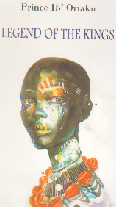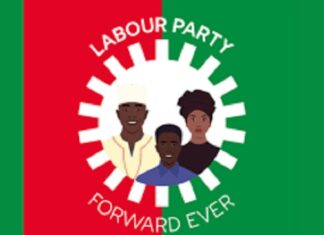Prince Ib’ Oriaku’s play, Legend of the Kings, published by Kraft Books Limited last year, is here reviewed by ‘Debayo Coker and Olutayo Irantiola.
It is very important to have a new dimension to the creative industry. This is the challenge by the quality of work done by Oriaku in the way he fuses poetic conversation into Legend of the Kings. He is able to open up the dramaturgy of the Niger-Delta region of the country. The story begins with narrations from three troubadours before the entrance of a high priest, Talebearer.
 The play can be summed up into a few sentences. Boka is the reigning King of Kirikese Kingdom, who receives the announcement of the birth of a set of twins with a lot of melancholy. One would have thought that he should be happy for the eventual safe delivery of his sons through the help of a midwife after the queen goes into labour for some days. A high level of anxiety is raised through the dramatic element of suspicion when it is not clear why the boys, their mother, and the attendants to the queen, including a white midwife, are all condemned to be killed as pronounced by the gods through their mouthpiece, Ikaki (the priest).
The play can be summed up into a few sentences. Boka is the reigning King of Kirikese Kingdom, who receives the announcement of the birth of a set of twins with a lot of melancholy. One would have thought that he should be happy for the eventual safe delivery of his sons through the help of a midwife after the queen goes into labour for some days. A high level of anxiety is raised through the dramatic element of suspicion when it is not clear why the boys, their mother, and the attendants to the queen, including a white midwife, are all condemned to be killed as pronounced by the gods through their mouthpiece, Ikaki (the priest).
One would have thought it was an era where twins were referred to as strange births and therefore should be killed. But far from that school of thought. As the drama later unfolds at the climax, King Boka had in his hey days eloped with the bride of a water spirit, Efereya, who is obviously angry and subsequently places a curse on Boka, making him impotent.
Boka, to prove his ‘virility’ to his subjects, deceitfully employs one of his aides to impregnate his wife. This further puts him on collision course with the gods. The boys are separated through some mischief: Fibika grows up in the palace, and the other, Ekwenji, grows up in the creeks and becomes a pirate. However, forces of nature bring them together and their eventual doom, as already proclaimed by the gods, is brought to the fore.
A lot of symbolism is employed in Legend of the Kings. Boka symbolises a proud and deceitful leader who knows what the exact problem is; rather than address the issues, he rigmaroles. More often than not, it seems, our leaders know the major issues affecting the lives of their subjects or citizenry, but they engage in some politicking at the detriment of governance.
Captain Allen symbolises a typical businessman whose major interest is his profit. Such merchants go about festering confusion among the people, even to the point that the more the bloodbath the greater their profit. Such deal in arms and ammunition and the best way an arms dealer profits is when there is a war. Ekwenji symbolises some people considered as social misfits. Most often than not, we fail to realise that some of those people are victims of circumstances. Ekwenji is a strong character, a great lover, a human rights activist. Ere symbolises true love that readily withstands all weather, rain or shine, even unto death.
The setting of the drama is Ijoh wetlands of the early 18th century pre-colonial Niger Delta, as the different wars, businesses and costumes sufficiently point to that. The two kingdoms in the play are Kirikese and Okoloma. The folkloric tradition of the two (riverine) kingdoms is richly explored, such that hardly does any scene pass without being interspersed by different traditional songs of the locals. The palaces of the two kings, Boka and Okparanjali, are built to reflect the grandeur of the royals in traditional African setting.
This play can be said to be a furtherance of the great works written by Professor John Pepper Clark-Bekederemo and other prominent writers from the region.
Some of the thematic tilts of the play include: deceit, greed, chivalry, betrayal, oppression, love, good leadership and neighbourliness. The story is written with sublime expressions grilled in poetic artistry and delivered with an exceptional theatrical tone.
It is exhilarating drama with each moment furthering a heightened curiosity and demanding foreclosures on seemingly loose ends. It is a very good recommendation for every lover of good drama. In addition, Oriaku has taken time to add 21 songs and their English interpretation. As such, even when the drama is being performed by Niger Deltans, the songs can be interpreted by the director for adaption into the new language community.
Some of the defects found in the text include: very long scenes; the “Queens English” being spoken by the locals and the whites speaking about the “gods”. Oriaku has done the Niger Delta proud with this publication and, hopefully, this will not be his last contribution to the body of literature from the Niger Delta.
• Coker and Irantiola are Lagos-based writers.













